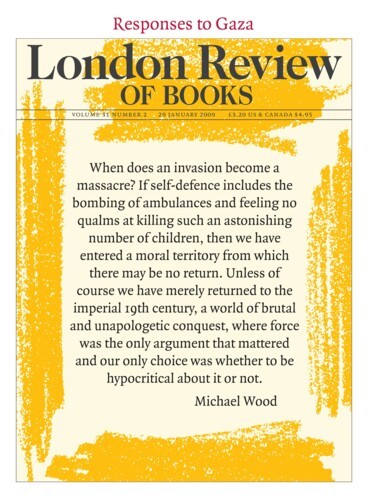Reviewers in the UK seem to have quite liked Invisible, Paul Auster's latest novel, and I was starting to wonder if it might be worth checking out – I haven’t read a book of his since The Book of Illusions (2002) – when
Christopher Tayler
Christopher Tayler is a contributing editor at the LRB.
James Ellroy comes across as being a difficult man to interview. It’s not that he clams up – he seems to love doing interviews – or only says boring stuff. But his schtick-to-vaguely-serious-answer ratio is highly variable, depending on what kind of mood he’s in, how much press he’s been doing lately and so on, and is in any case quite hard to judge. Choose the wrong day, or press the wrong button, and you’ll get something like this (from a 2006 New York Times Magazine interview): I am a master of fiction. I am also the greatest crime writer who ever lived.
My parents were science fiction fans in the late 1960s and early 1970s. In the 1980s, between the ages of about 10 and 13, I read quite a lot of their paperback collection: Isaac Asimov, Poul Anderson, Harry Harrison (some of his were for children and some were mordantly political) and Larry Niven, best known for his novel Ringworld. I didn't know at the time that Niven was and is a resoundingly unhip figure even by the standards of science fiction novelists.
Stories should be able to bear more than one interpretation, and Judith Kerr's books have been read in some interesting ways. But how polysemous is The Tiger Who Came to Tea, a picture book about a tiger that turns up one afternoon on a little girl called Sophie's doorstep and consumes all the food and drink in the house? Maybe not enough to justify the theory that the mother is an alcoholic who dreams up the tiger’s visit in order to explain the vanishing of ‘all Daddy’s beer’. If anyone’s an alcoholic or problem drinker in The Tiger Who Came to Tea, it’s the father. It's his beer, after all; perhaps he drinks too much of it because of the stress caused by his work as a pimp (see the illustration ‘And it can't be daddy, because he's got his key’). He might also be violent: the mother’s anxiety when she realises that ‘I’ve got nothing for Daddy’s supper’ – my italics – gives a Frank Booth-in-Blue Velvet-like undertone to ‘Just then Sophie's daddy came home.’
Passing-Out Time: Patrick Hamilton’s drinking
Christopher Tayler, 29 January 2009
Louis MacNeice, it was sometimes said, was always in the pub but never really of it. Much the same could be said of Patrick Hamilton, who was best known in his lifetime for his stage chillers Rope (1929) and Gaslight (1938), but is mostly remembered for the expert depictions of joyless interwar boozing in Hangover Square (1941) and the trilogy Twenty Thousand Streets under the Sky (1929-34)....
Read anywhere with the London Review of Books app, available now from the App Store for Apple devices, Google Play for Android devices and Amazon for your Kindle Fire.
Sign up to our newsletter
For highlights from the latest issue, our archive and the blog, as well as news, events and exclusive promotions.


